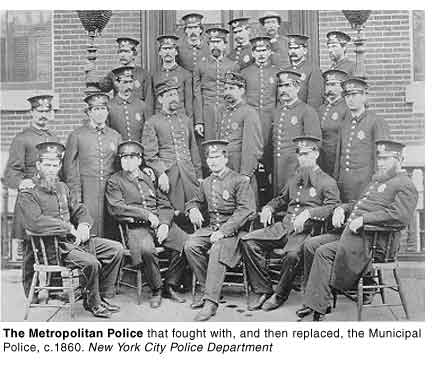
From the New York Herald, Saturday July 4, 1857.
THE POLICE CAMPAIGN
Practical Effects of the Decision
– The Old Force Deprived of
Authority as Officers – Order to
Disband – Scene and Speeches –
The Old Police Remain as Guests of the
City in their Station
Houses – Proceedings at White
Street – Wholesale Police Making –
Proscription of Foreigners –
Interview of the Mayor and Mr.
Tallmadge – The Mayor Refuses to
Convene with the Commission.
&c.,
&c.,
&c.,
___________________________
The full decision of the Court of
Appeals was read in the city papers yesterday morning. By
special urgency of the parties in the White street interest :
Albany, and through the special advocacy of the
republican press, the decision was given by the Court one day
sooner than had been fixed upon, so that it should at
once go into effect, and its result precede the public
demonstrations for the Fourth of July in this city and its
neighborhood. The expediency of this was thought to have
particular importance for the
preservation of the peace, especially
as the promulgation of the decision to-day it was thought might
lead to disturbances and difficulties between the rival forces.
 | ||
The decision came to hand therefore
yesterday morning, including due notice from the proper
authorities – the clerk of the Court of Appeals and the
Attorney General Cushing probably – to the Mayor.
This, of course completed the fact without further possibility
of a doubt, that the Mayor of New York no longer had any
authority to retain the present force in his special control,
as it also step aside all authority as officers of the existing
municipal police. The decision, taken with the previous
action of the White street commissioners, did not leave an
authorized man in the city station house who could presume to
arrest for breach of the peace.
COMPLIANCE WITH THE LAW.
The municipal force were prepared of
course for this, from the telegraphic dispatches of the
previous day. All police power was understood to be
exclusively vested in the Metropolitans. The Municipals
accordingly grounded their arms and stood ready for the
anticipated orders from the municipal head of the
department. At an early hour in the morning a message was
telegraphed from the Chief’s office, ordering the
Captains to withhold their men from the usual police duties,
and retain them in the station houses for further instructions.
The order was accordingly put in force, and throughout
the forenoon there was not a Municipal policeman seen outside
his station house on any duty through the day. The
compliance with the law, as soon as it was finally determined,
was therefore immediate, and not a single act can probably be
cited as having been even accidentally done in violation of the
law, when it had been definitely ascertained.
SCENE AT THE CHIEF’S.
In the course of the forenoon there
was quite a gathering of the police captains and their friends
off an on at the Chief’s office. Mr. McKellar, in
Mr. Matsell’s absence, sat in the chair of the dethroned
civic chief. A number of the captains were gathered
around him, and did him humorous homage, and as they each
arrived made a pleasantry of handing in their last reports.
There could hardly be assembled a more jovial looking
throng and laughter and wit and repartee seemed to prevail with
a spirit which might have better become the Metropolitans in
their serenading revels of the previous night. Leader of
the crowd was Captain James Leonard of the Second ward, who,
with his characteristic good spirits imperturbable temper,
sustained the occasion with a good grace and portly firmness,
which even the old Chief Matsell himself would hardly excel.
The captains pretty much all dropped in before noon, and
duly received the final orders of the Mayor, which were
formally handed to them to promulgate at their stations before
2 o’clock.
WHITE STREET.
The great anxiety of the White street
people for the decision at the earliest possible moment kept
their attention so much engaged on the anticipation that when
it did come it found them badly prepared for the event.
Even their purpose to make a grand display of
rejoicing fell through comparatively, and their
illuminations, their bonfires and their cannonading before City
Hall was all knocked in the head. They, in the first
place, have had none of the money, no pay to discount as yet
and to there was a material drawback in
this connection. The decision
coming a day or two in advance of their anticipations made
still another drawback, whilst the recurrence of the Fourth of
July demonstration will of course swallow all they may yet
attempt so that none but themselves will understand anything
they may do for other than pure legitimate Fourth of July
matter.
 | ||
But the matter of the immediate
recurrence of Independence Day so close upon the decision of
the Court of Appeals will put the Police Commissioners in
a particularly awkward position. Whilst the decision
necessarily disbands the old force, and leaves them powerless
as officers, the Metropolitans are by no means in readiness to
take their places, especially upon so trying an occasion as
Fourth of July in this city. In view of this the
Commissioners began to fill up their force yesterday, and as
soon as it was told them that the Municipal force would
necessarily be disbanded, they realized their predicament with
such vividness that quite a sensation prevailed at their office
through the day.
PROMISCUOUS METROPOLITAN ORGANIZATION.
Messages were sent in every direction
for the applicants on file in the office, and the neighborhood
was soon crowded. There was not a quorum of the Board in
town, as Gen. Nye had gone up to Cortland to deliver a Fourth
of July oration, and Commissioner Crowel had left the city
also, to spend the Fourth. Names were called for and
answered to, and every man who could be had was sworn in as a
policeman, in all the instance where they could be appointed in
the absence of a quorum of the Board. In the course of
the day no less than eighty policemen were made, of which the
following list presents those who had been previously passed
upon by the Committee on applications and removals
[Names are given here along with
appointments to a particular Ward]
SPECIAL POLICE.
Besides these, there were still
others, and when no more of a legitimate character could be
hurried through, Simeon Draper and the Brooklyn Commissioner,
Mr. Stranahan, sent in all quarters for whoever could offer, to
be sworn in as a special force. They were not able to
achieve a great many of those for want of men, but canvassers
went out to spend the night in drumming up others, who will
have been sworn in this morning. It was ascertained that
the supply of “shield badges” was exhausted, and
that accordingly a number of hatbands with “Metropolitan
Police” lettered in them must be provided forthwith for
these “specials.”
FOREIGNERS EXCLUDED.
The Board has not appointed any
Irishmen thus far, with a very few “good
republican” well enclosed exceptions. The like
distraction had been made with respect to Germans, the
Sixteenth Ward being, however, allowed a few of the vacancies
as will be observed by the orthography of the foregoing list.
These Germans have, like the Irish, been endorsed by the
black republican ward committees. The Commissioners say
that the particularly “naïve” complexion of
the appointments is owing to the pernicious activity of
Commissioner Cholwell and his backers in the lobbies at White
street.
DISBANDING THE MUNICIPAL FORCE.
In the course of the day the final
orders of the Mayor to the late police force under his control
reached the different station houses, when due action was taken
upon by the captains. It was as follows: -
Office of the Chief of Police
New York, July 3, 1857.
New York, July 3, 1857.
GENERAL ORDER 165
To Captain______ ____.
SIR: - The Court of
Appeals having decided in favor of the constitutionality of the
act to establish a Metropolitan Police district, it is
our duty to yield to that decision, and to acknowledge this law
as binding and obligatory upon our conduct. Whatever may
be the opinions of the great body of the people as to the
tyranny and injustice of legislation which deprives us of the
right of self government, and however repugnant this law is to
our local pride and independence, we have no present recourse
but compliance and submission. So far, therefore, as the
existing police organization of the city is concerned, as
formed pursuant to the law passed anterior to 1857, now
repealed, we have no discretion but to abandon and dissolve it
at once and forthwith. Its official power is gone, and we
have no authority to continue it another hour. You will
therefore assemble your men and read to them this order, and
withdraw them from all patrol or other official service.
Whether a municipal day and night watch is consistent
with this decision, and whether it shall be established
pursuant to the ordinance of the Common Council approved June
2, 1857, is a matter for future determination. I shall
announce the conclusions on that subject at an early day.
You will in the meantime, and until further orders,
remain in charge of the station houses and all other
Corporation property entrusted to your care and require the
officers and men under your command to deliver up to your
custody the police property in their possession.
FERNANDO WOOD, Mayor.
____________________________